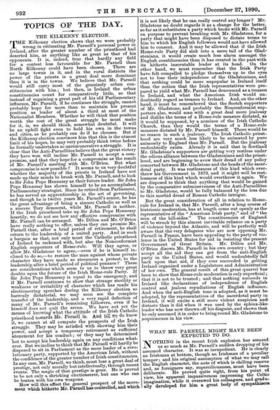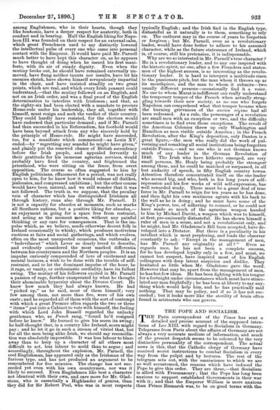WHAT MR. PARNELL MIGHT HAVE BEEN EXPECTED TO DO. N OTHING
in the recent Irish explosion has amazed us so much as Mr. Parnell's sudden dropping of his assumed character. It was so inexpedient. He is dearly an Irishman at bottom, though an Irishman of a peculiar temper; and his original assumption of what we may call the English character, the note of which is chilling reserve and, as foreigners say, superciliousness, must have been deliberate. He proved quite right, from his point of view, his apparent impassiveness impressing the Celtic imagination, while it overawed his colleagues, and gradu- ally developed for him a great body of sympathisers among Englishmen, who in their hearts, though they like bonhomie, have a deeper respect for austerity, both in conduct and in bearing. Half the English liking for Napo- leon III. was founded on their respect for an external calm, which great Frenchmen used to say distinctly lowered the intellectual pulse of every one who came into personal contact with the Emperor. It would have paid Mr. Parnell much better to have kept this character on, as he appears to have thought of doing when he issued his first mani- festo, with its air of steady dignity. Even when the mutiny broke out, he should have remained externally un- moved, have flung neither taunts nor insults, have let his enemies shriek, have shown himself scrupulously impartial in the chair, and have insisted steadily on two great points, which are real, and which every Irish peasant could understand,—that the mutiny followed on an English, and not on an Irish order, and was a final proof of the English determination to -interfere with Irishmen ; and that, as the eighty-six had been elected with a mandate to procure Home-rule under his leadership, they all, together with himself, must resign and seek the verdict of their country. They could hardly have resisted, for the electors would have endorsed that particular demand ; and if Mr. Parnell had then succeeded in his Referendum, his foothold would have been beyond attack from any who sincerely hold by the principle of Home-rule. He might have succeeded, too, for a manifesto which commenced—as Louis XV. ended—by " regretting any scandal he might have given," and plainly put the renewed chance of British ascendency before the Irish people, and appealed fervently to their gratitude for his immense agrarian services, would probably have fired the country, and frightened the priesthood, who were sitting on the fence, from overt opposition. The course so often suggested to him by English politicians, effacement for a period, was not really open to him, for he knew how it would release all dislikes, jealousies, and compressed ambitions ; but the other course would have been natural, and we still wonder that it was not followed. The truth is, we suppose, that the peculiar vein of character which has distinguished Irishmen all through history, runs also through Mr. Parnell. It is not a capacity for abandon at moments, such as marks all Southern nations, but a positive liking for abandon,— an enjoyment in going for a space free from restraint, and acting as the moment moves, without any painful thinking or any care for consequences. That is the im- pulse which, as we believe, sends otherwise decent folk in Ireland occasionally to whisky, which produces motiveless ructions at fairs and social gatherings, and which evolves, often on the most unexpected occasions, the outbreaks of " bedevilment" which Lever so dearly loved to describe, and evidently considered the most marked differentia between his countrymen and the Northern peoples. It is an impulse curiously compounded of love of excitement and mental laziness, a wish to be done with the trouble of self- restraint, and to let the dominant impulse of the hour, be it rage, or vanity, or enthusiastic cordiality, have its fullest swing. The mutiny of his followers excited in Mr. Parnell a passion of rage, further exasperated by what he thought their abominable hypocrisy about the Divorce Court. He knew how much they had always known. He had " picked up," as he said, most of them himself ; very few among them, not more than five, were of his own caste ; and he regarded all of them with the sort of contempt with which a great Premier often regards the two or three " items " put into a Cabinet to vote with himself, the feeling with which Lord John Russell regarded the unlucky gentleman who, as Punch sang, "found he'd resigned before he knew." He burned to give his scorn its swing ; he half-thought that, in a country like Ireland, scorn might pay ; and he let it go in such a stream of vitriol that, but for all the men being alike Irish, we should say reconcilia- tion was absolutely impossible. It was less labour to blaze away than to keep up a character of all others most difficult to act, less labour to scold than to argue ; and accordingly, throughout the explosion, Mr. Parnell, the cool Englishman, has appeared only as the Irishman of the furious type, and has not produced an argument to be remembered for five minutes. The change has not suc- ceeded yet even with his own countrymen, nor was it likely to succeed. Even Englishmen like best a character not identical with their own, and care more for Mr. Glad- stone, who is essentially a Highlander of genius, than they did for Sir Robert Peel, who was in most respects typically English ; and the Irish find in the English type, distasteful as it naturally is to them, something to rely on. The outburst may in the course of years be forgotten or forgiven ; but Mr. Parnell, even as a revolutionary leader, would have done better to adhere to his assumed character, while as the future statesman of Ireland, which is, of course, still his pretension, it is indispensable. Why are we so interested in Mr. Parnell's true character ? He is a revolutionary leader, and to any one inspired with the historic spirit, no one, after a few Founders and states- men of the highest success, is so interesting as the revolu- tionary leader. It is hard to interpret a multitude risen to the passionate pitch, but the man whom it throws up as its mouthpiece, and the man to whom it submits—two usually different persons—occasionally find it a voice:- No one to whom Marat is indifferent can really understand the temporary temper of the French when actually strug- gling towards their new society, as no one who forgets Napoleon can comprehend what that temper became when the burning grievances of the ancien reyinie had all been redressed. As a rule, the personages of a revolution are small men with an exception or two, and the difficulty sometimes is to find even those exceptions. The revolt of the American Colonies threw up only Washington and Hamilton as men visible outside America ; in the French Revolution, after the King's deposition, only Danton is a great figure,—the men who really did the work of pul- verising and remaking all social institutions being forgotten outside France,—and no one who is not German knows much of any leader in the German Revolution or 1848. The Irish who have hitherto emerged, are very small persons, Mr. Healy being probably the strongest among them, and he could be matched or surpassed, in all but audacity of speech, in fifty English country towns.. Attention therefore concentrated itself on the one leader who seemed big, and who, both in his long years of self- repression and his few weeks of wild self-expression, has well rewarded study. There must be a great deal of true force in Mr. Parnell to reign for ten years as he has done, and then fight his own mutinous agents with his back to the wall as he is doing ; and he must have some of the King's power, too, of adhering to counsel, or he could not have made so much of the agrarian weapon handed to him by Michael Davitt, a weapon which was to himself, at first, pm-eminently distasteful. He has shown himself a ruler of men in a sense, and not a revolutionist only, and' he might, had Mr. Gladstone's Bill been accepted, have de- veloped into a Dictator. But there is a peculiarity in his intellect which is most perplexing, and leads the observer constantly to ask : " Except in the management of men, has Mr. Parnell any originality at all ? " Even as regards men, he has not been a complete success, for he has developed loyalty only in a few, and must, we cannot but suspect, have inspired most of his English colleagues with deep latent suspicion and dislike. They hesitated so little when Mr. Gladstone gave the word.. However that may be, apart from the management of men, he has but few ideas. He has been fighting with his tongue for a fortnight under circumstances which must have stimu- lated any man frightfully ; he has been at liberty to say any- thing which would help him, and he has practically said nothing. That may be policy, and if so it has not suc- ceeded ; but it looks more like the sterility of brain often found in aristocrats who can govern.



































 Previous page
Previous page